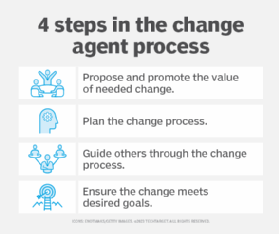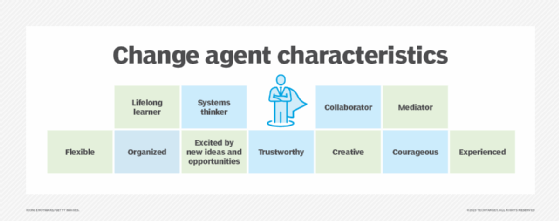What is a change agent (agent of change)?
A change agent, or agent of change, is someone who promotes change and enables it to happen within any group or organization.
In business, a change agent is an individual who supports and facilitates a new way of doing something within the company. This can be the use of a new process, the adoption of a new management structure or the transformation of an old business model into a new one.
A change agent is sometimes also called an agent of change or a change advocate. The terms champion, change champion and change agent are often used interchangeably; however, some see differences between the roles each one plays in supporting change. For example, a change agent is viewed as having more responsibilities and accountability for making sure that change happens successfully than a change champion does.
Internal vs. external change agents
Managers and executives are often expected to be change agents within their organizations. However, internal change agents are not limited to high-ranking, C-level leaders. A change agent can be any employee with the right mix of skills, characteristics and authority to shepherd others through the transformation.
A change agent can also be someone outside the organization, such as an external consultant hired to help with a change effort.
Although a change agent can come from within or outside an organization, a successful change agent is someone whom people respect and whom organizational change affects. They also tend to be well informed about the various facets of the project, the organization and the staff involved.
What change agents do
Regardless of the actual position or job title a change agent holds, an individual who takes on the task of being an agent of change assumes responsibility for the following:
- Promoting the value of the transformation.
- Formulating how the transformation will happen.
- Guiding and supporting others through the transformation.
- Making sure that the new processes, procedures and organizational structures are implemented to deliver the value that the organization expected.

Overall, a change agent serves as a liaison between an organization's leadership that sponsors a change initiative and the people affected by the change.
The change agent helps articulate reasons for the change, answers questions and persuades others about the necessity of the initiative. They also escalate concerns to leadership and decision-makers.
Change agents' roles and responsibilities
To achieve change management objectives, a change agent assumes responsibilities that start once leadership decides to undertake an initiative. That way, the change agent can contribute to the initiative's implementation strategy, action plan and decision-making process.
By assigning a change agent at the start of an initiative, their objectives, responsibilities and metrics for success can be incorporated into the project plan.
The following tasks typically become the duty of the change agent:
- Explaining why a change is taking place and who will be affected.
- Advocating for the change initiative.
- Disseminating information.
- Highlighting the potential benefits and drawbacks of the proposed initiative.
- Anticipating and evaluating areas of potential dispute or disruption.
- Developing strategies to counteract any potential areas of dispute or disruption.
- Obtaining feedback to share with leadership and conveying responses.
- Serving as a point person to hear others' concerns, ideas and questions.
- Advising stakeholders and affected individuals.
- Mediating points of contention.
- Tracking and managing objectives of the project.
Types of change agents
There are three primary types of change agents, each focusing on a different aspect of transformation.
People-centric change agents
These agents prioritize employee engagement, motivation and morale. Their work includes these areas of focus:
- Helping employees adjust to the change.
- Providing training and upskilling opportunities.
- Setting clear goals and offering continual support.
Structure-centric change agents
These agents focus on reshaping organizational infrastructure through more systemic activities:
- Researching and implementing new technologies.
- Performing system analyses to identify process improvements.
- Restructuring teams and workflows to optimize efficiency.
Process-centric change agents
These agents focus on optimizing business processes and facilitating collaboration among teams. They make sure that the following goals are met:
- New workflows are effectively integrated.
- Teams communicate efficiently throughout the transformation.
- Operational improvements align with business goals.
Organizations should select change agents based on the type of transformation being undertaken and the skills required for success.
Change agent characteristics
To ensure success, leadership should choose a change agent based on characteristics commonly identified as the most effective for positions such as chief transformation officer. Those characteristics include the following:
- Diversified knowledge.
- Experience in the business discipline that the change effort affects.
- A willingness to ask tough questions.
- Flexibility, creativity and an openness to new ideas.
- A strong network.
- Trustworthiness and credibility.
- An understanding of the organization's corporate culture.
- Courage.
- The ability to tell a company narrative.
- Excitement for new opportunities and potential.
- Comfort working through uncertainty.

Important change agent skills
A change agent must have the following skills to be successful:
- Leadership and influence. The ability to gain support and inspire others.
- Strategic thinking. Identifying opportunities and risks.
- Strong communication. Clearly articulating goals, expectations and benefits.
- Emotional intelligence. Understanding and managing resistance to change.
- Relationship-building. Fostering trust and collaboration across teams.
- Project management. Making sure that the change process stays on track.
A certain level of technical knowledge might also be important. Change agents should be familiar with common digital transformation tools.
Why agents of change are important
An effective change agent serves a distinct role within a change initiative as a proponent of the change, as well as a conduit between leadership and the rest of the organization. A successful agent of change can help smooth resistance to change.

Another role of a change agent is problem-solving and addressing issues before they derail an initiative, ultimately ensuring the successful implementation and adoption of a new change project.
Change agents are more than just advocates -- they are leaders, facilitators and problem-solvers who help organizations successfully implement change. Whether focusing on people, processes or structure, their influence makes sure that new strategies are adopted smoothly and effectively.
For organizations undergoing significant transformations, identifying and empowering the right change agents can make the difference between success and failure.
Change agents are important to organizations as facilitators of digital transformation. Learn the top three challenges that individuals pushing for change face when implementing a digital transformation.





